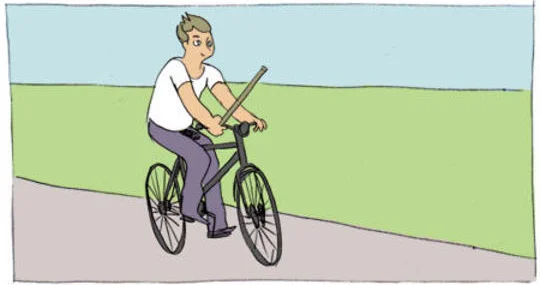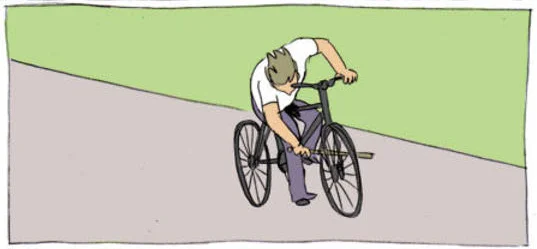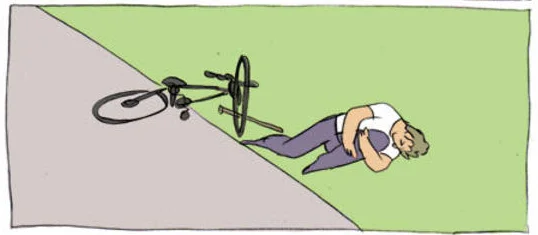
Who Did This?
In a lot of ways, the explosive growth of AI was forseeable. Where we go from here … is up to us.
How did we get here?
I want to spare you another long nostalgic screed, so let us just say that publishing content on the web used to be laborious. The technical knowledge to make ‘web pages’ was a barrier for a lot of diverse opinions being put forth for public consumption. Only the most adept nerds could express their opinions online in the early days! (source: I am an adept nerd with bad opinions, expressed online in the early days)
And once content was on the ‘web’ how do you find it? Before search engines and aggregators, this, too was a chore. Maybe a friend would share something interesting with you. Maybe you saw it linked somewhere. A URL on a piece of paper on a bulletin board at a library. Finding things that interested you was tough, and bookmarks were very important!
So blogs, right? Or updated home-pages. What was published was long-form writing, usually. Back then we actually had time to write and read pages of content (or at least posts on usenet) because, frankly, we didn’t have tons of other stuff to do ‘online.‘
Hold on to your butts
Technology would arise to change the dynamics of who can publish. And that’s great! blogging sites and software helped to remove the technical barriers to publishing. Not to make you feel old bog this down with statistics, but: Blogger was launched in 1999, WordPress in 2003, Youtube in 2005, Tumblr in 2007, Medium in 2012.
The diversity of opinionated content available is vast. The nerds are no longer that digital gatekeepers of expressing yourself online (although some seem to be pretty mad about it).
So now everyone can post content! And they do. They just keep posting. It’s a lot. Every commercial and public interest has a web presence. And the services that enable you to express yourself are exploding also, having an exponential effect.
Oh no that’s too much
So now we need trusted sources to filter through all this. Perhaps you have a friend who knows about a certain topic. Or you luck yourself into finding a linkblogger who shares your tastes and you can follow their direction to content written on the topics that interest you.
The problem is, those people don’t scale. And their tastes and interests can diverge from yours, making the pairing become less tenable. You can’t ask Jason Kottke to suddenly get really into Himalayan sweaters or arm32 processors (honestly I tried finding topics that Kottke hasn’t written about and I … really can’t find many)
Rise of the machines
The solution to tailoring the discovery and aggregation of content to every individual, is to have that individual enter their preferences into a machine.1 You have been doing this since you started using search engines, they’ve just gotten better at remembering you and what you like.
(this is good and bad)
In addition to remembering you and what you like, they’re remembering people who are similar to you, and what they like.
(this is probably mostly bad)

Servers cost money
Hosting search engines costs money. (new Porsches cost money also). So search engine companies have to make money by spying on what you like, and selling that data to advertisers. At first this wasn’t really creepy, until… they started taking input & direction from those advertisers to show you things the advertisers wanted you to see.
This is the mostly bad part I mentioned - the search engine advertisers become like all other advertisers, and want to influence what you see.
People need to eat
The other side of this is, the people producing the content aren’t writing this in their spare time as they sit alone in their rented room surrounded by computers instead of friends (source: it me2). People who are putting more time into creating quality content, naturally want to get paid for it. Attempts to create micro-payment networks based on consumption have largely failed, so avertising has become the primary revenue stream for people who make content.
The more and higher you show up in search results, the more clicks you receive, the more ads get seen with your content, the more money you make (in theory). So it became a game of steering their content to the search engines themselves, and that usually means changing their content to be less desirable for humans.
Example: how many times have you searched for a recipe, to find one on a blog that ends up being woven into a yarn spun about their grandma and where their grandma grew up and how their grandma taught them to make these biscuits when they were knee-high to a grasshopper and…
Monetization and Search-Engine Optimization shape the content being produced to appeal to machines, not busy humans.
This time he’s back, for good?
Two references to The Terminator movies in the same blog post? Let’s do this.
When is the last time you read a long-form blog post? An entire news article? Can you even remember?
Attention spans are shrunk and our ability to carve out and justify time to read long-form works is more and more difficult. Nevermind if you’re trying to find information for some sort of urgent cause.
“I just want the recipe!” “Just tell me the one simple trick!” “No really, is this plant poisonous to dogs???”
Our desires have steered technology yet again. We don’t want to sift through the rambling cascade of inane paragraphs. We want to drill down to what’s specific and valuable about this content. And we may want to do this on multiple sites, and compare the results to formulate a concensus opinion about something. You know what does that a lot faster? AI.
Does it get everything right every time? No. Does it give you a reasonable answer in a reasonable amount of time? Yes. Are you free to go further and dig deeper into primary sources if something is really important? Also yes.
We did this
Our consumption habits and behavior patterns have coincided with the development of technology, to drive AI aggregation, summarization and reshaping of data. Our brains want the nugget — the tweet, the toot, the snap, the insta. Meanwhile, advertising-driven content creators make SEO-friendly articles full of cruft. We’ve asked (the void) to remove the cruft, and AI has done so.

What is next
What comes next is largely up to us also. Will we continue to use AI to seek out information? Probably. Will we regress to linkblogs, directories and webrings? Not likely.
The things that will drive what comes next are all about the same incentivizing factors that built the web before AI.
How will (AI) make any money?
AI is incredibly expensive to train, yet we’re in a honeymoon-phase where they’re giving us the results for free. They have to have a plan for this to be viable, and even profitable. Will every chat-whatever interface be full of advertising? Are they collecting data about your habits and preferences to sell to advertisers on traditional web-based media and apps?
How will creators react?
How can people who produce content continue to get paid in a world where their knowledge is harvested, processed, and distributed without the primary source being credited? Will people move all their content inside of walled gardens, or onto platforms that can deflect being used for AI training? If this happens, will we have the same difficulty with discoverability that we had in the 90s?
It can’t be all bad
True, this will sound like pale consolation. But what we’ve learned from decades of technological evolution is that things will change only as much as we tolerate it. If search engine A gives us too much AI and hides primary sources, the people who want to dig deeper will go elsewhere. If social media company X wants to steal our content and make it difficult to find our friends, users will flock to other platforms.
People have dealt with these types of trends well before the internet. (does anyone remember “the invisible hand”4 from Economics class?). Consumer preferences will drive the direction of technology, because consumption drives revenue. What form that revenue takes and/or how it’s transfered (e.g. from users to advertisers to search engines) has yet to be fully developed, but we will see it come to pass if the tech companies ever want to make money off of their huge investment.
Keep making the choices that are best for you and the people you care about, and the economy-of-information will be steered by your preferences.
Footnotes
-
okay maybe i’m still a little mad about how i can’t show off my prowess in crafting precise queries in AltaVista anymore (this is the best guide i can find from those days and, wow, I wasn’t even scratching the surface). ↩
-
here’s your treat (or punishment) for reading the footnotes. in 1999, i was renting a bedroom in a house in Newton, Massachusetts. We had a MediaOne cable modem - 8 megabits! And i had no less than three computers running most of the time. And i got a logitech webcam, because, why not i guess? so here you go ↩
-
the three images of the bicyclist with the stick are taken from a meme based on a piece of art called ‘Baton Roue’ by french artist Corentin Penloup. view the full version here or you can find out more at the KnowYourMeme page about Baton Roue. ↩
-
I knew that stuff about Adam Smith would come in handy again someday. Further reading at Investopedia. ↩
